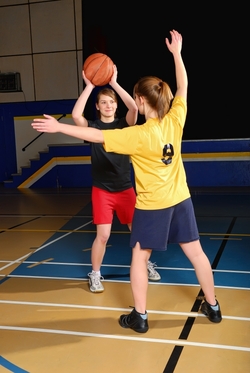Getting high school physical education back in the game
 |
Fort Worth, TX
8/12/2009
By Deborah J. Rhea
Here’s the paradox. Elementary and middle school physical education programs continue to improve. More physical educators are applying successful movement education and skills-approach models in the K-8 setting. At the same time, however, there is less physical education in high schools, and less expected of older students.
This is a dangerous trend. As children mature, their percentage of body fat tends to increase, and they become less physically active. The Centers for Disease Control and Prevention reports that being unfit as a youth correlates highly with being unfit as an adult. Physical inactivity is the second-greatest killer in the United States behind tobacco use.
The deterioration of high school PE and increased concern for higher TEKS scores drove the Texas Legislature to pass a bill that decreases the number of semesters required for physical education from 1.5 years to 1.0 year and cuts health as a required course at the high school level. Eliminating health and cutting the number of semesters required of PE from the high school setting will not solve the obesity or the sedentary issues nor increase success on state mandated tests.
In spite of keeping some PE in the high school setting, many educators feel that more, not less, PE is needed to change sedentary and obesity issues presently.So how can we improve PE? Here are a few suggestions for putting high school physical education back on track:
Make physical education classes smaller. We have seen a trend over the past 20 years of administrators’ expecting P.E. teachers to take on larger numbers of students, in a crowded environment, and control them without assistance. SB 891, was passed recently stating that student-teacher ratio in physical education classes be comparable to that in academic classes. It also requires a school district to identify the manner in which the safety of the students will be maintained if physical education classes have more than 45 students per one teacher. This language allows administrators to continue placing high numbers of students in classes with minimal support. Administrators need to support physical education by sticking to the true intentions of SB 891.
Give administrative support to physical education. Many school administrators never darken the doors of the gym as long as complaints are minimal. And they often schedule other school activities in the P.E. teacher’s classroom (the gym), and expect the teacher either to sit for the class period or do some alternative activity that may not have any P.E. value at all. Assemblies, science fairs, and book fairs often find homes in the gym—at the expense of P.E.
Require physical education teachers to teach P.E. An administrator could walk into some high school gyms and find physical education teachers who also are coaches planning workouts for the athletes they will see later in the day. Not all P.E. teachers who coach do this, of course. But it is not unusual in programs where sports are deemed more important than physical education. Administrators too often miss the opportunity to hold lazy teachers accountable and to praise the ones who are doing a great job.
Physical educators bear some responsibility for reversing the trajectory of high school P.E. programs. We need to hold ourselves accountable before others will consider changing the situation. P.E. teachers must maintain or begin to build high expectations for their students.
Physical educators are allowing others to dictate what happens to their profession, instead of taking control of events. A coordinated, multilevel approach involving schools, communities, and policymakers will be needed to increase participation in daily, high-quality physical education for all students.
Deborah J. Rhea is an associate professor in the department of kinesiology at TCU. She is a member of the editorial board of the Journal of Physical Education, Recreation, and Dance.
Media contact:
Shawn Kornegay
Assoc. director of communications
817-257-5061
s.kornegay@tcu.edu










